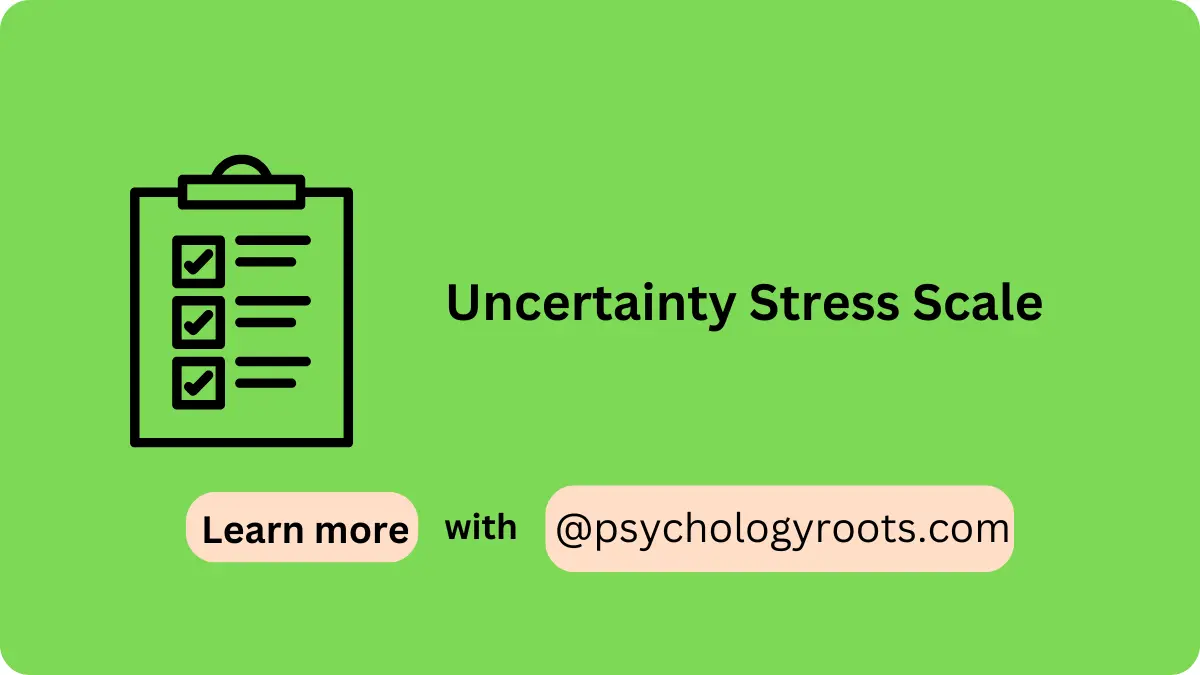Table of Contents
Uncertainty Stress Scale
Here in this post, we are sharing the “Uncertainty Stress Scale”. You can read psychometric and Author information. We have thousands of Scales and questionnaires in our collection (See Scales and Questionnaires). You can demand us any scale and questionnaires related to psychology through our community, and we will provide you with a short time. Keep visiting Psychology Roots.
About Uncertainty Stress Scale
Scale Name
Uncertainty Stress Scale
Author Details
Hilton, B. A. (1994); Wu, D., Yang, T., et al. (2022)
Translation Availability
English, Chinese

Background/Description
The Uncertainty Stress Scale (USS) is a psychometric tool designed to measure the stress individuals experience due to uncertainty in various life situations. Originally developed by Beverly A. Hilton in 1994, the scale has become a reliable instrument in assessing uncertainty-related stress, particularly in healthcare and clinical settings. The scale examines how uncertainty impacts mental and emotional well-being, often focusing on patients dealing with medical diagnoses, life transitions, or unpredictable events.
Recent advancements have expanded its use beyond clinical populations. For instance, Wu et al. (2022) validated shorter versions (4-item and 10-item) for broader community applications, especially among Chinese adults, highlighting its cross-cultural relevance. The scale addresses various dimensions of uncertainty, including cognitive and emotional responses, helping clinicians understand the psychological impact of ambiguous or unpredictable situations.
Administration, Scoring and Interpretation
- Obtain a copy of the Uncertainty Stress Scale from authorized academic or clinical sources.
- Explain the purpose: To assess an individual’s stress levels related to uncertain or unpredictable circumstances.
- Provide clear instructions: Participants rate their feelings on a Likert scale, reflecting how uncertainty impacts their stress levels.
- Approximate duration: Administration typically takes 5-10 minutes, depending on the version (10-item or 4-item).
- Administer the scale in a quiet, stress-free environment to ensure accurate responses.
Reliability and Validity
The Uncertainty Stress Scale has demonstrated robust psychometric properties. Hilton’s original study established high internal consistency and reliability. Subsequent research by Wu et al. (2022) reinforced these findings, validating the 4-item and 10-item versions in diverse populations. Both versions showed strong construct validity, correlating well with established stress and anxiety measures. Cross-cultural validations, particularly in Chinese communities, indicate that the USS is reliable across different demographic and cultural contexts.
Available Versions
04-Items
10-Items
Reference
Hilton B. A. (1994). The Uncertainty Stress Scale: its development and psychometric properties. The Canadian journal of nursing research = Revue canadienne de recherche en sciences infirmieres, 26(3), 15–30.
Wu, D., Yang, T., Herold, F., Hall, D. L., Mueller, N., Yeung, A., … & Zou, L. (2022). Validation of the 4-Item and 10-Item uncertainty stress scale in a community-based sample of chinese adults. Psychology Research and Behavior Management, 2803-2813.
Important Link
Scale File:
Frequently Asked Questions
What is the Uncertainty Stress Scale?
It is a psychometric tool designed to measure stress caused by uncertain or unpredictable situations.
Who developed the original scale?
The scale was developed by Dr. Beverly A. Hilton in 1994.
Are there shorter versions of the scale?
Yes, 4-item and 10-item versions have been validated for broader use, especially in community settings.
How long does it take to complete the scale?
It takes approximately 5-10 minutes, depending on the version used.
What populations is the scale suitable for?
The scale is suitable for clinical patients and general populations experiencing uncertainty-related stress.
Disclaimer
Please note that Psychology Roots does not have the right to grant permission for the use of any psychological scales or assessments listed on its website. To use any scale or assessment, you must obtain permission directly from the author or translator of the tool. Psychology Roots provides information about various tools and their administration procedures, but it is your responsibility to obtain proper permissions before using any scale or assessment. If you need further information about an author’s contact details, please submit a query to the Psychology Roots team.
Help Us Improve This Article
Have you discovered an inaccuracy? We put out great effort to give accurate and scientifically trustworthy information to our readers. Please notify us if you discover any typographical or grammatical errors.
Make a comment. We acknowledge and appreciate your efforts.
Share With Us
If you have any scale or any material related to psychology kindly share it with us at psychologyroots@gmail.com. We help others on behalf of you.